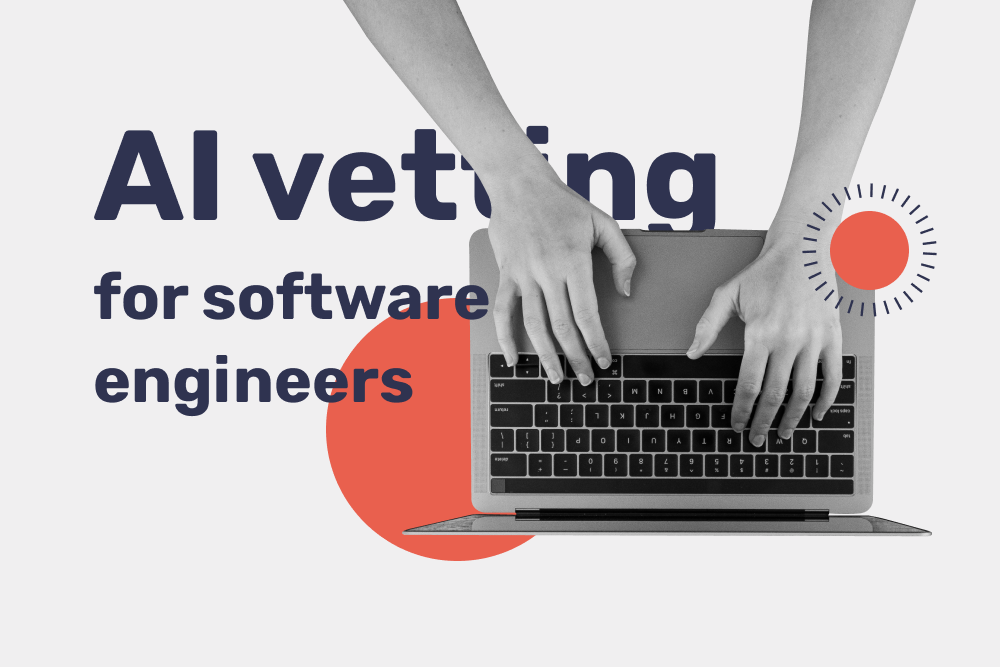Every business owner knows that hiring decisions directly influence the company’s success and might hit the wallet when done wrong. But nevertheless, there are many cases when companies hire ill-suited candidates. Why does it happen?
Various factors contribute to the quality of the hiring process, and untrained interviewers are also among them. If a person conducting a technical interview lacks technical knowledge or expertise, they fail to accurately assess candidates’ skills and abilities.
To avoid challenges related to bad hires, like missed opportunities and budgetary concerns, it’s essential to build an effective technical interview process. And we at Bridge know how to find an engineer who brings the required skills to our clients’ projects. There are various methods for conducting tech interviews that differ depending on the company and the job role, but some of them work equally well for various scenarios. So, let’s take a look at them to help you attract top tech talent to your team.
Effective methods for conducting a technical interview
Of course, no one is booing the traditional interviewing process when a hiring manager asks a set list of interview questions for technical positions. And you can do it as well ‒ prepare tech questions and ask them one by one as usual. However, the methods discussed below will help you simplify the process, make it more effective, and let you get higher chances of attracting top-level talent.
Simple elimination question
It’s a great way to narrow down the pool of potential candidates before accepting resumes. To give you an idea, here is how it works. When posting a job description, add a simple technical question to it and ask candidates to answer it. Those who provide a satisfactory answer can be allowed to send their CVs. For example, when looking for a Python developer, you can ask questions like, “Name the differences between a list and a tuple in Python” or “What are Python modules? What are they used for?”
Here are some more questions to ask a Python engineer:
25 Python Interview Questions to Hire the Best Developers for Your Team
Sure thing, this method can’t be used as a full-fledged hiring tactic ‒ it works great at the very start to shorten the number of job-seekers you need to assess. Further, you should implement other technical interview techniques to proceed with your hiring campaign. Let’s summarize the pros and cons of this method.
| Pros | Cons |
| ✅Saves time for both recruiters and candidates | ➖Possibility to overlook qualified candidates |
| ✅Lets you toss out low-skilled candidates at the very beginning | |
| ✅All candidates are initially vetted based on the same criteria |
Multiple choice questions
Multiple-choice questions (MCQs) can be a valuable component of the tech interview process, especially in the initial screening stages. It allows you to assess a broad range of knowledge quickly, while fairly comparing all candidates. However, it might be useless for filling specific roles, for example, when problem-solving is essential. That’s why, you should combine it with other assessment methods, like coding tests, presentation of previous projects, and more, to get a more comprehensive view of a candidate’s abilities. Here are additional benefits of using this technique.
| Pros | Cons |
| ✅Effective method that covers a wide range of topics | ➖Possibility of guessing or cheating |
| ✅Objective assessment eliminating bias | ➖Not suitable for all roles |
| ✅Easy comparison of candidates based on their scores |
Whiteboard challenge
A whiteboard challenge is a popular tactic in the software development and engineering fields. It involves presenting a coding or problem-solving task to a candidate and asking them to solve it on a whiteboard.
This way, a hiring manager evaluates the candidate’s technical skills and follows their thought process when trying to find the solution on the spot. Besides, a whiteboard challenge models a real-world scenario, where an interviewer can adapt the difficulty level based on the candidate’s responses and provide a tailored assessment. Although this technique has essential benefits, it still hides some pitfalls to pay attention to.
| Pros | Cons |
| ✅Universal method to test technical skills | ➖Might be stressful for candidates |
| ✅Comprehensive evaluation of problem-solving abilities | ➖Suitable only for tech-savvy interviewers |
| ✅Opportunity to assess how a person articulates their ideas |
Coding test
A coding test is a nice alternative to the whiteboard challenge. Unlike the latter where a candidate has to solve a task on the go, in this case, an applicant is given a specific amount of time to complete the test and further present it to the interviewer. It’s a great way to directly assess technical skills without putting a candidate in a stressful situation of doing the task in front of the interviewer. What’s more, a coding test simulates a real-life scenario, allowing interviewers to evaluate a candidate’s readiness to deal with role-specific tasks and challenges.
But despite numerous benefits, the method is not ideal since it overlooks such important skills as teamwork, communication, and more. Besides, when scheduling the interview, mind that apart from the time set for task completion, you need some time to review the task and provide feedback.
| Pros | Cons |
| ✅Possibility to vet technical proficiency | ➖Risk of cheating when unsupervised |
| ✅Simulates a real-world scenario | ➖Requires significant time |
| ✅Working method to assess problem-solving capabilities |
Presentation of a previous project
When asking a candidate to describe one of their previous projects and their role in it, an interviewer can comprehensively assess how a person uses their technical skills in practice. What’s more, it demonstrates the candidate’s ability to understand the whole project lifecycle, from concept to implementation and maintenance.
Presenting their best project, a potential employee can showcase their communication and analytical skills, while an interviewer can evaluate a depth of technical knowledge when diving deeper into the details. At the same time, an experienced candidate can foresee such a task and prepare a presentation beforehand, which might mislead an interviewer in some cases. So, it’s better to weigh all the pros and cons before using this method in your hiring process.
| Pros | Cons |
| ✅Possibility to evaluate practical application of theoretical knowledge | ➖Can be prepared in advance |
| ✅Great way to assess communication skills | |
| ✅Universal method for all roles |
But note that when preparing for a remote interview, you should consider combining assessment methods with other hiring tactics, since none of them is effective when used separately. What’s more, these techniques won’t help you find a qualified engineer unless you have technical expertise yourself.
Pitfalls to avoid in technical interviews
The above-mentioned strategies prove that an interviewer, be it a business owner or a hiring manager, should possess sufficient technical knowledge to assess candidates adequately. Besides, there are some other reasons why an individual might fail to find the right person for hire.
It would be difficult to hire a qualified engineer if you:
- Overestimate your technical expertise
- Fail to make a good first impression on a candidate
- Evaluate solely technical knowledge and skills
- Can’t explain to a candidate why they should work for your company
- Don’t prepare for the interview substantially
Fortunately, you can prevent all these pitfalls without extra help, but for one ‒ technical expertise. If you don’t have it, you won’t get it in a day or week. That’s why, it’s recommended to delegate technical interviews to companies with the necessary skills or partner with recruitment companies like Bridge.
We offer candidate sourcing services and thoroughly vet technical skills to ensure you get a qualified engineer. Our recruiters provide from 15 to 30 viable candidates a month, allowing you to kickstart the interview process fast.
Trust technical vetting to Bridge
Bridge is a global recruitment company with years of experience, so we understand how hard it is to find a person with the required technical skills and also meets your company culture. That’s why our mission is to help companies find and add expert engineers to their teams without hassle. For that, we offer two types of services to meet diverse project requirements ‒ IT staffing and sourcing-as-a-service.
IT staffing
It’s a perfect match for your project if you have no time or resources to launch a full-scale hiring campaign in-house ‒ we will do the job for you. Our hiring experts source candidates in 14 countries across the globe and have the technical expertise required to accurately evaluate candidates’ skills and knowledge. Next, we provide you with the list of the best applicants and you conduct final interviews with those you approved. We cover paperwork, administration, and payroll operations, while you pay only a monthly or daily rate for the actual developer’s work, without any hidden expenses or overheads.
Sourcing-as-a-service
Sourcing-as-a-service is a great solution to finding qualified candidates without breaking a sweat. We source candidates using an automated data engine which narrows the talent pool and makes the outreach 5 times faster when compared to manual sourcing. Next, our sourcing managers vet candidates’ resumes, skills, and work experience, and provide you with a list of the most fitting engineers, while you pay only a monthly fee. It’s up to you when to interview and hire a candidate ‒ tomorrow or in a month.
Need to fill a tech position but don’t have enough expertise? Partner with Bridge to find skilled developers with ease!



